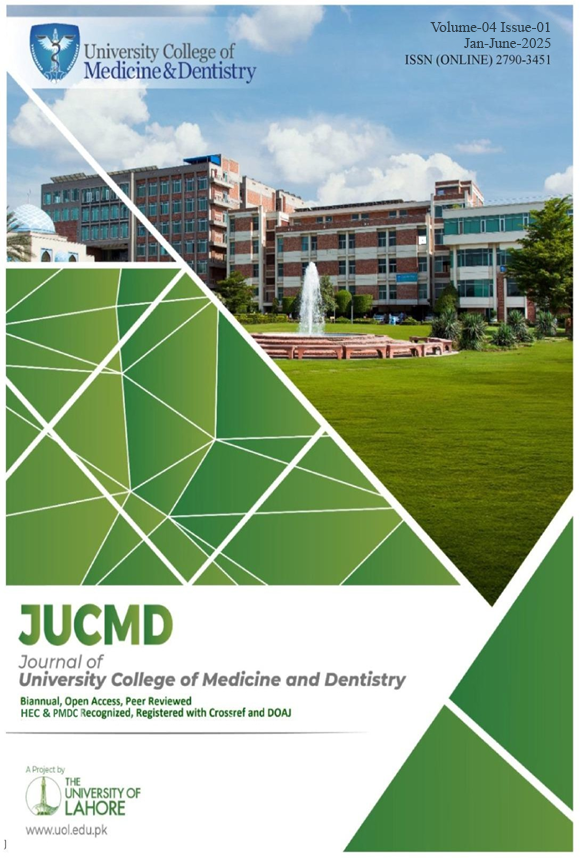Psychosocial Resilience and Quality of Life in Patients with End-Stage Renal Disease Undergoing Hemodialysis: A Cross-Sectional Study
DOI:
https://doi.org/10.51846/jucmd.v4i1.3667Keywords:
End Stage Renal Disease, resilience, social support, quality of life, hemodialysisAbstract
Objective: To evaluate psychosocial resilience and quality of life (QOL) in patients with end-stage renal disease (ESRD) undergoing hemodialysis at a private hospital in Punjab, Pakistan.
Methodology: This cross-sectional study included 191 ESRD patients undergoing hemodialysis at a private center in Lahore, Pakistan, from January to December 2022. Eligible participants were aged 18 or older, diagnosed with ESRD, and receiving regular hemodialysis. Exclusion criteria included acute kidney injury, incomplete medical records, cognitive impairments, or psychiatric disorders. Resilience was measured using the Connor-Davidson Resilience Scale (CD-RISC), and quality of life (QOL) was assessed with the WHOQOL-BREF™ questionnaire. Demographic and clinical data were also collected. Data were analyzed using SPSS version 25.0, with descriptive statistics, one-way ANOVA, and post hoc Bonferroni correction. A p-value of <0.05 was considered statistically significant.
Results: The study involved 191 hemodialysis patients with a mean age of 53.4 ± 14.2 years, 45% male and 55% female. Common co-morbidities included hypertension (85%), diabetes (65%), and cardiovascular disease (40%). The mean duration of ESRD was 5.6 ± 3.2 years, with 70% undergoing hemodialysis three times per week. Most patients (60%) had higher education, while 15% had no formal education, and 70% were married. Resilience, measured by the CD-RISC, had a mean score of 45.27 ± 8.35, and QOL, measured by the WHOQOL-BREF™, had a mean score of 51.71 ± 6.30. Both scores were significantly lower than population norms (p = 0.029 for resilience, p = 0.001 for QOL), indicating considerable psychological challenges.
Conclusion: ESRD patients on hemodialysis experience low levels of psychosocial resilience and quality of life, highlighting the need for targeted interventions to improve these critical aspects of patient well-being.
Downloads
Published
How to Cite
Issue
Section
License
Copyright (c) 2024 Hassan Zahid, Jehanzaib Islam

This work is licensed under a Creative Commons Attribution 4.0 International License.
Authors retain copyright and grant the journal right of first publication with the work simultaneously licensed under a Creative Commons Attribution 4.0 International License that allows others to share the work with an acknowledgment of the work's authorship and initial publication in this journal.
Authors are able to enter into separate, additional contractual arrangements for the non-exclusive distribution of the journal's published version of the work (e.g., post it to an institutional repository, in a journal or publish it in a book), with an acknowledgment of its initial publication in this journal.
Authors are permitted and encouraged to post their work online (e.g., in institutional repositories or on their website) prior to and during the submission process.







